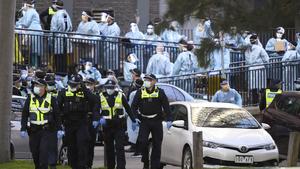 Police officers and healthcare workers are stationed outside a public housing tower that is locked down as a Coronavirus hotspot in Melbourne, Australia, July 8, 2020. (JAMES ROSS / AAP IMAGE VIA AP)
Police officers and healthcare workers are stationed outside a public housing tower that is locked down as a Coronavirus hotspot in Melbourne, Australia, July 8, 2020. (JAMES ROSS / AAP IMAGE VIA AP)
The southern Australian state of Victoria has virtually been closed to the rest of the country as the state battles a new outbreak of COVID-19 which has seen Melbourne, the state capital, locked down for the next six weeks.
As five million people in the Melbourne metropolitan area prepared to sit the next six weeks out, the government on July 9 confirmed 165 new coronavirus cases overnight, its fourth straight day reporting triple-digit daily rises in infections.
This is particularly important when you cannot maintain social distancing indoors such as gyms and cafes and going outdoors in crowded settings like public transports and markets.
Dr Abrar Chughtai, director of the Master of Infectious Diseases Intelligence program in the School of Public Health and Community Medicine, University of New South Wales in Sydney
The border connecting South Australia and New South Wales have been closed to all traffic from Victoria. Only exempted vehicles, such as food and medical transport, can cross.
In Sydney, health officials are tracing fifty passengers from a Jetstar flight from Melbourne that flew into Sydney on July 7 and were not screened for coronavirus.
Health experts said the lapse in health protocols could lead to an outbreak in Sydney like that which has forced the lockdown of Melbourne.
READ MORE: Virus: Australia deploys police, army to enforce border closure
Jetstar Group CEO Gareth Evans conceded the breach was "unfortunate".
"They (screening protocols) are different in every state and that causes confusion," he said.
University of Melbourne’s clinical director Dr Alex Polyakov said the current strategy will not be enough to contain the outbreak in Victoria.
Despite border controls, the virus will spread to other states, he said.
“Once community transmission takes hold, it is almost impossible to control the spread with the currently implemented measures.
“The good news is that the health systems in Victoria and other states are sufficiently prepared to deal with the probable influx of symptomatic patients in the near future,” he said.
Polyakov said lockdowns and movement restrictions “will only be partially effective” and further actions are required to minimize the spread of the virus.
“In my opinion, the most effective, and so far largely neglected strategy, is universal wearing of masks in public. This should be implemented immediately and will certainly enhance the current strategies.”
Professor Catherine Bennett, chair in epidemiology at Deakin University in Victoria, said there is good evidence that masks can decrease risk of infection if “they are handled correctly, fit well, and are disposed of properly”.
ALSO READ: Thailand issues guidelines for travellers to enter country
“This is true for COVID-19 in community settings where there is a reasonable risk of exposure, as long as other hygiene and distancing measures are already being used.
“We do not currently have levels of virus circulating in the general community to warrant mandatory use of masks, but in areas with high concentrations of positive people, masks may add an extra layer of protection, especially when indoors in shared spaces like supermarkets,” she said.
“This is particularly relevant to people who are in the higher risk categories for more severe illness.”
Professor Bruce Thompson, dean of the school of health sciences at Swinburne University in Melbourne, agreed.
“The use of standard surgical masks is now recommended when out in the general community; in particular, cluster areas and areas such as public transport,” he said.
Another leading expert, Dr Abrar Chughtai, director of the Master of Infectious Diseases Intelligence program in the School of Public Health and Community Medicine at the University of New South Wales in Sydney, said masks should be mandatory in Melbourne.
“We need to understand why we should use masks now. There are two functions of masks in the community – use by healthy people to protect from acquiring infection and use by sick people to prevent the spread of infection,” he said.
“This is particularly important when you cannot maintain social distancing indoors such as gyms and cafes and going outdoors in crowded settings like public transports and markets.
“I am not sure why people are not convinced – this is just another infection control intervention.”


